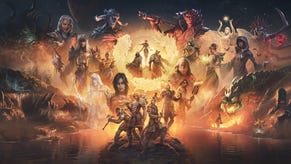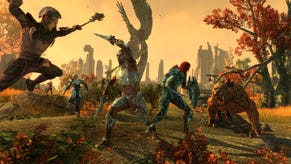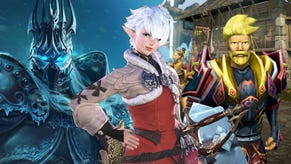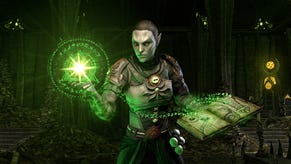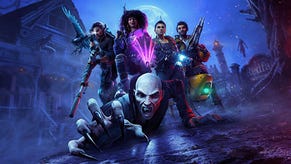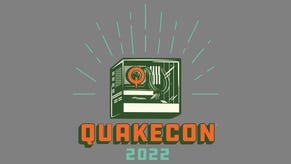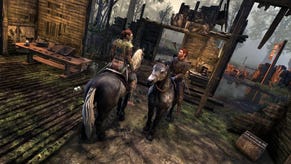Interview: Zenimax Defends Elder Scrolls Online
Cyrodiil Welcomes Careful Grinders
If you've only got 15 minutes to wow a crowd, it stands to reason that you'd unload your biggest guns until even the most ardent doubters would have no choice but to fly a white flag with your face on it. Elder Scrolls Online's E3 presentation, then, was worrisome. The action-based combat looked hollow and unconvincing, and we spent the bulk of our time watching a perplexingly un-Elder-Scrolls-like quest chain involving ghosts, time travel, and "collect X amount of Y item" prompts unfold. Meanwhile, the potentially unique three-way factional PvP battles got a chaotic 45-second flyby video that looked like what'd happen if an upturned anthill learned magic.
But then, let's face it: even at their best, MMOs don't demo well. That in mind, I attempted to get a clearer picture from creative director Paul Sage. So then, what exactly sets TESO apart from a legion of increasingly same-y looking online worlds? Can we mix and match classes as we see fit? Can we slaughter random NPCs? Does TESO stand a chance in a hostile MMO landscape that's even chewed up SWTOR? And, most importantly, will there be books? It's all after the break.
RPS: You dedicated a lot of the presentation to discussing how solo quests can affect the world - for instance, by putting a horde of restless ghost baddies to rest. Is the goal of Elder Scrolls Online to more or less make the player feel like the hero of a single-player RPG?
Paul Sage: Absolutely. One of the things we set out to do was make you feel like the hero. You saw when you went back in time, and you saw the direct results of that [in the present]. That is one of the big things we want to do, because we want NPCs to react to you when you come back to town - ala Oblivion's running "You're the hero of Kvatch" joke. We want NPCs to recognize your accomplishments and those things.
RPS: But, generally speaking, MMOs do kind of a terrible job of making us feel like heroes. Other people run and leap and spam general chat all around, and they're doing the exact same things as you. Why not instead focus on constructing a world that doesn't try to ignore that?
Paul Sage: It's a matter of perspective. If you feel like NPCs respect your accomplishments, there's nothing that says other people being around takes away from that. In fact, it enhances that.
RPS: Right, but MMO NPCs are about as low on the NPC food chain as you can go. Typically, they're rooted in one place for the sole purpose of spewing exposition and quest info. I'm not sure how much I'd really care if one said, "Hey, you're totally that guy who slew the one thousandth instance of Xan'thulrex, the giant beagle."
Paul Sage: With us, our NPCs might recognize your accomplishments or something else that's not even an accomplishment. They respond to what you've done, so it does feel more like a living, breathing world. NPCs have professions - and I know that's true of a lot of other games - but specifically what I mean is the NPC's responses will change based on what the player's done. Race and class choice is also a factor [in those responses].
You can also look at our goal to crown a player emperor. There's faction warfare, and that's one of the things where, yeah, you really are special. But if you don't want to do the quests, you're more than welcome to just go explore the dungeon content. So really, if that's your goal where you don't want to be the hero, we'll have an option for you there, too.
RPS: So is the emperor system endgame-only? Also, are you doing anything else to sort of break outside the traditional MMO mold and move into more player-driven, emergent territory?
Paul Sage: I absolutely don't think that's the only thing [along those lines]. You get to take over keeps and things like that. When you get into these large player battles, that's something where almost all gameplay is completely emergent. You never know what's going to happen in a situation like that. That's why we make MMOs. That's why we're excited about it. So that's the kind of emergent stuff I think really sticks. So I think the emperorship is a great thing, and I think the keeps are a great thing.
I also think that being able to control the way your character progresses - the way I get to slot in abilities - or even say, "Hey, I'm a mage and I have this axe, so I'll use this axe." Little things like that really make you be able to play the way you want to play.
RPS: How would it work if I were a mage who used an axe? Is the weapon skill leveling open and usage-based like in earlier Elder Scrolls games?
Paul Sage: It's not really usage based so much as it is what I slot in. But you will grow. You'll grow in power and discover new ways to use the axe. So, absolutely, that's something we felt really strongly about. If I find a certain weapon, I should be able to pick it up and use it.
It's not an open class system in [an optional design-your-own-class] type of way, though. When you see somebody on the battlefield, you'll kind of know the broad range of what they're capable of, but you won't know the specifics of what they've slotted into their shortcut bar at the time. So we do want some structure, but we also want to give you a lot of customization.
RPS: The E3 presentation was basically a chain of clearly defined glowing quest-givers. Will there be more impromptu exploration, though? Environments that tell their own stories, etc? Will there be books?
Paul Sage: There's absolutely a place where you'll find books. Will that start off a quest? Absolutely, that could start off a quest. You can also find lots of places where there are no quests at all. One of the things I don't think we've talked about a lot is the fact that we have content that just kind of emerges from the world. So you'll see bandits out lugging someone - so to speak - and you can decide to run up and kill the bandits if you want to. It's really your call if that's what you want to do. Or maybe you do something else in that situation. It's those things that are also sprinkled throughout the world.
There are also what we're calling Daedric Anchors in the world. Daedra filter out of them [and attack]. It's a little bit reminiscent of Oblivion Gates. That, again, is something where you'll be in the world, and suddenly, there's just something over there. And then the player has something they can do to remove that Anchor from the world. I don't want to call it an event so much. It's just a happening in the world.
RPS: Can I kill NPCs who aren't necessarily enemies? Can I go rampaging through towns?
Paul Sage: There will be NPCs that aren't necessarily bad guys that you will be able to kill. Like, can I play the villain? I think that's the fantasy for some people. They really want to play the villain, so we're going to support that.
RPS: Mainly, though, you cited action-based combat and an involving storyline as the things that will set Elder Scrolls Online apart. But, admittedly, those things have been done in other MMOs - for instance, Tera and SWTOR, respectively. So how do you stand out?
Paul Sage: Well, you can take almost anything and say it's been done in another game. It's really about how it's done. It's taking a quest and discovering that it takes a little bit longer. We reveal the story over time - which, you know, is never going to sound special until you play it.
As for the action-based combat, I really do think it sets us apart. I know there are other games that have it, but specifically, when you're playing online with your friends, we have synergy abilities where you pair up. Those kinds of things definitely take it [to the next level]. You definitely have the large PvP battles. It's really a matter of how it all blends more than any one specific thing, because we can look at almost anything and say "Hey, another game has done something similar to this."
RPS: When you first revealed Elder Scrolls Online, you got a fair amount of backlash from fans. It's not first-person, there's a WoW-esque action bar, etc. Have you been listening, though? Do you plan on revamping any specific aspects of the game to address those complaints?
Paul Sage: It's interesting, you know, there's going to be reaction from a lot of things. One of the things that would be bad would be to react to something you just see - as opposed to when you play. When people are playing the game and giving us feedback, we're absolutely going to be looking and saying, "That is something we need to change." But a lot of people see the action bar and see it as something that's bad, because they picture rotation's going off - you know, these long chains they set up - as opposed to what we really tried to do with it, which is, you can't pause combat during an online game.
So, for us, it's a matter of having abilities that are easy to access on a keyboard-mouse setup. So it was really straightforward to put them on these shortcut bars and see how it works. Then, when you start playing, you realize you can use an ability with only a slight delay before you can use it again. But you can use it until your mana or stamina bar runs out, and you pair it with this real-time thing, and it really starts to feel good.
Even internally, we play every day, and then we have an every week playtest where the whole company stops what they're doing, play for a few hours, and then we write up what we liked and didn't like. We're pretty hard on ourselves, too.
RPS: Do you have a timeframe for when players will get to give you feedback - like, via a beta or something?
Paul Sage: 2013.
RPS: Are you worried at all by the current state of the MMO market? I mean, EA recently launched SWTOR - which, like you, had strong story content and a beloved license behind it - but it's already deflating due to a general feeling of "been there, done that" from players - especially in regard to endgame. How will Elder Scrolls avoid a repeat performance?
Paul Sage: It's interesting because, when we say MMO, we just say the word as if it means something. And I know what you mean, but for us, the first thing is that it has to be a compelling game - a compelling RPG. So first, we plan out a number of hours. So when we're planning internally, we'll say, "OK, here's the number of hours where we really have enough content." Then what we look at is what's repeatably fun and what actually works to be repeatable. And you heard me mention our dungeons at level 50, for instance, you can go in and replay, but it's new content. It's not the content you've seen before.
But when you look at Skyrim and how many hours people will put into that, that's part of the plan. I don't want to talk post-ship because we're not out yet, but we know that there needs to be content coming in that's new and fresh. And I will tell you that I love the PvP system, and why I like PvP is because that always feels like "That is really cool." Especially the three factions. I'm sure you've seen that in another game, but it's so much fun to be able to play it and crown an emperor - to have these things going on. I don't want to speculate about number of hours, but I would say I've played a game like that where I've spent more than several hundred hours.
RPS: Sure, but I think many people would also argue that SWTOR was a "compelling RPG" first and foremost. Speaking personally, I feel like there's just something tiresome about the traditional MMO formula. Like, "go here, kill ten of these, gain XP, level up" is really good at hooking new players for a couple hundred hours, but once they burn out, they really burn out.
Paul Sage: I think, for us, it's really a matter of making sure the game feels fresh right away. I can't say more to how it feels after you've played 500 hours. No one at the office has played 500 hours. But I can say that it feels fresh when you first get in there - and intentionally so. We have a huge number of people that have worked on previous online games, and we've realize that there's not just a cookie cutter way to do this. We have to do it such that it feels fresh.
RPS: So Elder Scrolls is finally going multiplayer. Is Fallout next?
Paul Sage: If you're just asking me personally, I would love to do that. I don't even want to begin to talk about how many hours I spent in Fallout 3, and it was great. But as a studio, we're just concentrating on this game right now. Obviously, though, it's something we're all super passionate about. I mean, that's not a PR line. I love Elder Scrolls, so I'm super happy to do it.
RPS: Thank you for your time.





